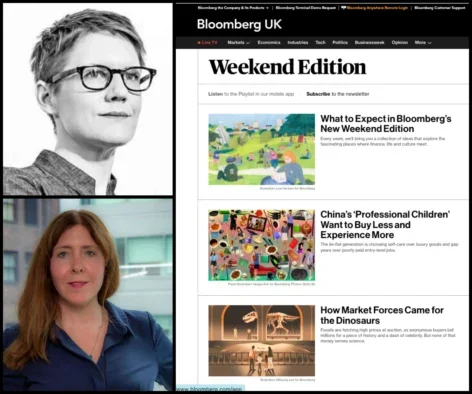
Bloomberg Media says it has added 200,000 subscriptions in the last four months as part of a growth plan that also saw it launch a new, magazine-style weekend offering last week.
Katherine Bell, the former editor-in-chief of Quartz who now serves as the inaugural executive editor of Bloomberg Weekend Edition, said the new product was designed “expressly for the way that people read and watch and listen differently on the weekend”.
The edition carries more features and lifestyle and cultural stories than the business publisher’s typical fare, as well as audio versions of the content meant to help it fit more easily into subscribers’ busy weekends.
The first issue of the Weekend Edition, which was given prominent placement on Bloomberg’s website and sent out to all Bloomberg subscribers as a newsletter, included stories on changing youth consumer habits in China, the emergence of dinosaur bones as an asset class and the Tokyo Metro’s initial public offering.
“It’s been really exciting to get individual emails from individual readers and hearing that they’re using it in the ways that we imagined,” she said.
As well as Bell, the Bloomberg Weekend Edition has several dedicated editors, whom she said are already in place in Sydney, Hong Kong and London. She added that the team were being cautious about how much content to produce, saying the team wants to “make sure that we’re fitting into the life they’re living on the weekend, not competing with them…
“It’s more important to me that we have the right stories that really help people think in a different way on the weekend and that it’s completable, so that it doesn’t feel like an overwhelming scroll of too many stories on the weekend.”
[Read more: Quartz editor Katherine Bell — Six things I’ve learned about how to run a global newsroom]
Group and enterprise subscriptions grow Bloomberg Media’s paid reader base by 240,000 in a year
Bloomberg Media’s announcement it has hit 740,000 subscriptions represents a nearly 50% growth in paid subs in a year.
Bloomberg Media chief digital officer Julia Beizer told Press Gazette most of that growth had been in group and enterprise subscription sales, which she described as one of Bloomberg’s “four levers of growth” alongside content, product and user experience and marketing.
She added that the publisher aims to hit one million paying subscribers “in the first half of next year”.
The launch of Bloomberg Weekend Edition was part of the “content” growth lever, Beizer said, adding that it had been created on the back of “a lot of audience research”.
“One thing we’ve found about this audience is that they’re incredibly ambitious – they think about their work, and getting ahead broadly, all of the time,” she said. “That doesn’t stop – that’s not a nine-to-five ambition, that’s an all the time ambition.”
The research also showed that 80% of its audience reads Bloomberg for personal life benefits, as well as a competitive advantage at work, and that readers spend 12% more time with the publisher on the weekend than on weekdays.
Beizer said: “Knowing that fact, are there ways we could feed that need differently, outside of the core news cycle of the markets?”
The launch had also been informed by the success of Bloomberg-owned print monthly Businessweek, which Beizer said was “very, very strong” at converting new subscribers and was widely-read among existing ones.
[Read more: Businessweek editor predicts print comeback as 120-page monthly edition launched]
All Bloomberg Weekend Edition articles can be listened to, either individually or in a playlist format. Beizer said “the goal of that product was – can we make a version of the Weekend that you could listen [to] while you’re driving your kid to practice, or while you’re on a long run… without it feeling arduous?”
Despite increased adoption of AI-read text-to-speech on news sites, the articles on Bloomberg Weekend are read by a mix of actors and the publication’s journalists. Beizer said Bloomberg had “seen some success” with machine-read audio going back as far as 2018, but “we have seen more success with human-read content just being more engaging for our audience”.
She added, however, that “AI is changing rapidly – I wouldn’t count the robots out. But for now, we really like the feeling of real voices”.
Bloomberg Weekend Edition ‘both an acquisition and a retention tool’
Beizer said Bloomberg sees the Weekend Edition as “both an acquisition and a retention tool”.
Subscribers have been opted-in to receive the newsletter automatically, Beizer said, and “the key metric we look at is days active per month, and so anything we can do to provide those subscribers for more reason to visit the site, whether it’s on the weekend or the weekday, I’m delighted about”.
A second weekend newsletter, intended to prepare readers for the week ahead, is due to launch in coming months.
On acquisition, Beizer said: “The flavour of content that we do – that lean-back, expansive, ‘what does it all mean?’-type content that we do in places like Businessweek, in the opinion section – those are very strong converters for us as well.”
Bloomberg Weekend content will be free to read for the next two months, after which it will move behind the paywall.
Beizer said: “We did a big audience segmentation study recently that looked at our subscriber base and our registered user base, and we found that there’s one segment of our audience that’s really looking for Bloomberg to deliver perspectives to help our readers inform how they view the world.”
The post Bloomberg launches Weekend product after adding 200,000 new subs in four months appeared first on Press Gazette.





























